 Double Feature:My Summer of Love
Double Feature:My Summer of Love - dir. Pawel Pawlikowski - 2004 - UK
+
Come Undone (
Presque rien) - dir. Sébastien Lifshitz - 2000 - France/Belgium
Before I begin... I want to let everyone know that this double-feature was hardly my own concoction. My good friend Bradford made the initial connection between the films and even wrote about it
here. My observations are of a similar nature, but I thought I'd talk about the films anyway.
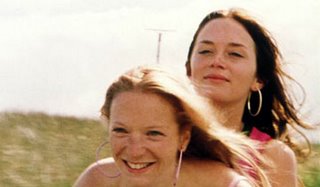
I've always hated Shakespeare's
Romeo & Juliet, probably more so because of all the girls I once knew carrying book, with its final act stained by tears and lip-gloss, everywhere they went than because of the play itself. This is not to say I never succumbed to the perils of teenage love, but even at a young age, I recognized the ridiculousness of it all. Romeo and Juliet were not soul-mates; they were a pair of whiny teenagers whose suicides have been misinterpreted by the young as the utmost of love and romance. After watching the
My Summer of Love/
Presque rien double-feature, I think I have a greater understanding of what
Romeo & Juliet was all about. At one point in
Presque rien, Mathieu's mother expresses her concerns about her son's summer romance after another woman says, "he's only seventeen." "That's the age where you fall in love," she responds, somberly. The line and the tone it's used in fully express why these films exist as they do. But what the mother doesn't know (or maybe does, but doesn't speak of it) is why these teenagers fall. And this, as Bradford pointed out, is where the two films become truly fascinating and worthy of comparison.
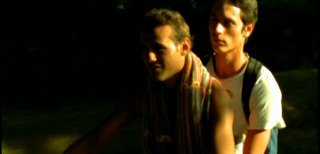
Stylistically, the films stand apart. Cinematographer Ryszard Lenczewski drenches
My Summer of Love in galvanizing sun. It'd be easy to call the film simply a mood piece, taking in the harmonious union of Goldfrapp's "Horse Tears" and "White Soft Rope" and the lush visual topography. But this union, instead, enriches the narrative. The film is way too beautiful to exist in any present reality, but, like any summer fling should be, it becomes even more enriched by our own memory. On second viewing, I noticed that the visuals never appear nearly as overbearing as I remembered them. The richness in aesthetics really lends itself well to the notion that
My Summer of Love doesn't capture a summer romance as much as it remembers one. This is more clear in
Presque rien, where we are presented with two worlds: the summer and the winter, the before and after (the winter beautifully accompanied by Perry Blake's "Wise Man's Blues" and "This Time It's Goodbye"). Told in non-linear fashion, Lifshitz interrupted the budding of a summer fling between Mathieu and Cédric with the wintery aftermath, having Mathieu's frivolous, youthful ambition reduced to a cold stone of a man. While there are obvious visual differences between the summer and winter here, cinematographer Pascal Poucet never immerses us in the way
My Summer of Love does. There's a hint of sadness even to the playful beach scenes, aiding us in exposing of Matheiu's state of mind and a better understanding of why he falls for Cédric and why it eventually falters.
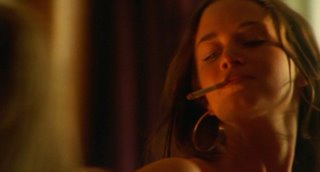
One of the strenghts of both films is their ability to escape from the singular narrative. We naturally have single protagonists in both films, Mona (Natalie Press) in
My Summer of Love and Mathieu (Jérémie Elkaïm) in
Presque rien. Yet our understanding of character and fulfillment extends beyond the two. They have their respective "lovers," Tamsin (Emily Blunt) and Cédric (Stéphane Rideau), who fill the void, and their complementary family members, Phil (Paddy Considine) and Mathieu's mother (Dominique Reymond), who both mirror the protagonists' sufferings and yet expand the already-large emptiness. Family life sucks for both Mona and Mathieu. Mona's mother died of cancer, and her father disappeared when she was young. Her brother Phil's emptiness has consumed him and has substituted sadness with Christianity. Mathieu's mother hasn't gotten over losing a baby three years prior and stays in her bed all day; his sister is a cold bitch, and his father is "away on business," which we gather to be a regular thing. Never do we find that Mona or Mathieu's void has lead them to homosexuality. The word "lesbian" is never spoken in
My Summer of Love. When Mathieu tells his mother of his affair, he doesn't say, "Mom, I'm gay;" he says, "Mom, I'm in love." The summer flings in both films are gender-specific. Mona and Tamsin dance around Tamsin's house listening to Édith Piaf and trying on clothes. Mathieu and Cédric grapple on the beach. However, their companionship is more youthful than it ever is "girlish" or "boyish." Both couples sing songs to one another and play around like children. As mentioned above, the relationships do not serve a one-sided purpose. Tamsin has her own reasons for engaging with Mona. Her family, too, is absent for various reasons, but it appears as though Mona has become the perfect audience for Tamsin's theatrics. It's never condescending (Tamsin is of a much higher class than Mona); it's simply a desire for attention. Mona becomes the perfect outlet for this attention hole within Tamsin, just as Tamsin becomes the familial closeness that Mona so strongly desires. Cédric's family is distant as well (notice a theme here?) and, in Mathieu, he seeks a permanence that he cannot get with his family, schooling, or work. For Mathieu, Cédric is the bond he cannot have with his family (or with his few friends, for that matter). In a sense, these bonds are all unstable. And they all fail.
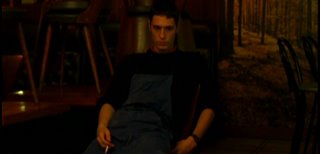
"Coming-of-age" is a difficult way to describe these films. I know it's a synonym, but "rites of passage" almost seems more fitting. Roger Ebert said about
My Summer of Love that it's not so much a coming-of-age film as it is a film about being of age, which is a statement, for once, that I would tend to agree with. Bradford very firmly states that neither are "coming-of-age" films, and while this argument could seem a rather futile battling of terminology, I don't wholly agree. The term "coming-of-age" quite literally means a transfer from childhood to adulthood (in case you didn't know), but often suggests the sexual blossoming of a youth. This is not the case here. While sex is certainly present in both films, it is hardly the eye-opener for Mona or Mathieu that one might expect. Mona's not a virgin; we see her fucking a married man in the back of a car early in the film. While there's no mention of Mathieu's sexual history (as Bradford stated in his review, the drama of
Presque rien, unlike
My Summer of Love, exists almost entirely offscreen), he doesn't become the man we see in the winter because he got laid. That would've been too easy. Mona and Mathieu come of age as a result of the bitter destruction of their void-fillers. Once reality sets in for both, their worlds crumble. Tamsin has to return to school. Mathieu's family must return to Paris. It's the reality that conducts the downfall, and the downfall that creates their transfer to adulthood.
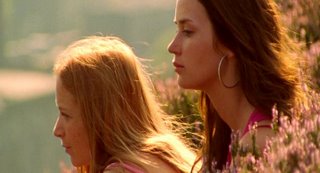
So how does these films help me in truly understanding Shakespeare's
Romeo & Juliet? It all comes back to Mathieu's mother's concerns about the age of falling in love. Is it impossible for a teenager to truly fall in love? I have no idea. As we all know, the pretense of love presents itself all the time, as in these films. Is the saddest part about these films the fact that the relationship fizzles, or that the pretense does? One could suggest that Mona's newfound hatred for her brother is her own way of hating herself. He replaces void with religion; she does it with Tamsin. Both consume their lives. Mona states that Phil doesn't have a girlfriend because talking to Jesus is a full-time job. Mona and Tamsin rarely part throughout the summer. During the winter, Mathieu becomes his mother, unable to communicate with the world. When we see him cry at the beginning of the film, it's not simply for his mother, but for himself and for his ultimate fear of succumbing to the world. The entrance into adulthood is not as easy process, and our characters react dramatically. None of the characters kill themselves as in
Romeo & Juliet, showing us that they're much stronger as humans. Their "love" is as false as that of Romeo and Juliet, but they walk away. Whether they find themselves and ultimately fill their voids, we don't know. But that they walk away, there's a shimmer of hope.


















